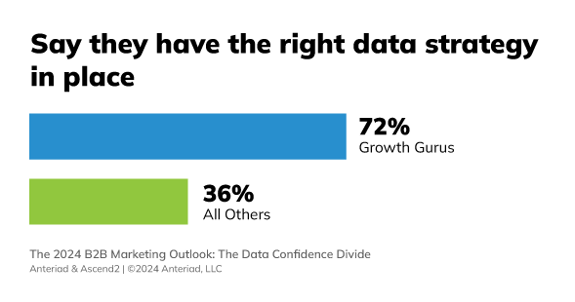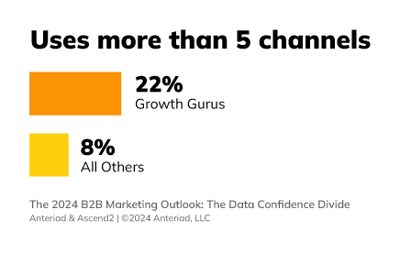Growth Minded Marketing
In our 2024 survey, 30% of marketers reported that their companies saw significant revenue gains over the past year. What sets these high-growth companies apart? It's not just their sales figures—they've embraced advanced marketing strategies that are rooted in data-driven insights, relentless testing, and an unwavering focus on the customer. We’ve dubbed these marketers 'Growth Gurus' because their approach goes beyond the basics, unlocking next-level success. Here’s a look at what they’re doing differently, and how these powerful tactics could inspire growth at your own organization.

The majority of marketers still aren’t seeing significant revenue growth, so we looked at the data to see if we could spot any potential differences that could provide clues and inspiration for marketers looking to drive higher growth at their own companies as goals get tougher and executives want measurable performance.
Growth Gurus:
- Embrace data and have a strong data strategy
- Have a culture of trying new and innovative tactics, data types, and technologies
- Prioritize authenticity and transparency in their marketing approach
Overview of Growth Gurus
First, the good news. After a couple of tough years, we saw more marketers say that their companies experienced significant revenue increases in the past year. Interestingly, the demographic profile of their companies aren’t so different from the companies that didn’t grow. We are not comparing little start-ups to big enterprises. Both groups were similarly made up of mid-sized and enterprise firms, companies that likely have well-established marketing teams.
However, the Growth Gurus were more spread out geographically, including more European firms (40% of the total of growth marketers compared to 28% of other marketers.) And the marketers who experienced growth also tended to be more senior with 46% of growth marketers at an executive level compared to 28% of other marketers at that level.
Could it be that our executive survey respondents were somehow more tuned into their company’s growth?
It’s possible. But, given that 79% of them expect to see significant increases in 2024 compared to just 19% of other marketers, we felt it was still important to see how they approached marketing—and we found a lot of meaningful differences!
A Strong Data Foundation

Marketers at growth companies are very confident in their data strategy and the data they use to drive their business. Nearly three quarters, 72%, say that they have the right data strategy in place compared to only 36% of other marketers. What’s more, 85% believe they are targeting the right personas and customer profiles compared to 37% of other marketers. They are also significantly more likely to say that they are executing effectively across both personalization and ABM.
While nearly every marketer uses data to personalize, Growth Gurus are more likely to use nearly every kind of data, showing an approach of trying many different data types to understand and reach their audiences. In particular, they are much more likely to use intent data, technographic data, and lifecycle stage. They are also more likely to incorporate predictive analytics into their data strategy. Interestingly, the two types of data they use less than other marketers are purchase history and geographic data.
Despite their data maturity, growth marketers still prioritize improving data quality. Ensuring good quality data is an ongoing process when there are always new kinds of data to test. And of course, having access to quality data enables new strategies such as scoring based on buying group, which is a top priority for 65% of growth marketers, second only to engagement scoring.
A Culture of Testing and Innovation
Another major standout difference of Growth Gurus is their use of new and innovative tactics and their willingness to test new things. They were much more likely to say that they are going to expand their approach to audience targeting, explore new demographics or industries, and expand market segments at 72% compared to 52% of their peers.
They are more likely to be using new tactics like influencer marketing and programmatic advertising. While all groups use social media advertising, influencer marketing speaks more to Gen Z and Millennial audiences, which makes growth marketers more likely to get in front of this group in a way that matters to them.

Programmatic advertising was once thought to be the domain of B2C advertisers, but growth marketers are proving that with the right data strategy, it is a valuable channel.
Growth Gurus are also more likely to be marketing to their audiences across more than five channels. In fact, 22% of growth marketers use more than five channels compared to only 8% of other marketers.
Creating an Authentic Connection
Growth Gurus don’t test and innovate at all costs. They are honest in their approach and attuned to the outcomes of their actions. 63% prioritize transparency as an important attribute for their brand, even more than customer-centricity, which they prioritize less than other marketers.
One indicator of their focus is their significant concern about the balance between AI and authenticity in their marketing. 61% are very concerned about their brand’s authenticity in the age of AI marketing, compared to only 20% of other marketers.
While AI is a valuable tool for marketers to automate and create efficiency, there is a danger that it can diminish the authentic connection B2B marketers have with their customers, and growth marketers are keenly aware of that risk. Growth marketers are also much more likely to consider authenticity in their brand marketing.
Interestingly, Growth Gurus are optimistic about their ability to balance AI and authenticity, with 72% saying that they can absolutely strike a balance compared to only 40% of non-growth marketers. Growth marketers focus on their customers and on authenticity, which gives them confidence in their ability to get their strategy just right.
Creating Growth
It can be hard for marketers stuck in stagnant companies to achieve great growth. Many respondents are frustrated by a lack of integration, issues with centralizing and accessing quality data and many other issues that may require increased budget, IT support and more. They should not despair. Growth marketers have their own challenges, namely integrating technology and creating and distributing targeted messaging. Wherever a marketer is on their journey, there is always an obstacle to overcome.
Even if a company is stagnant, marketers have the opportunity to adopt some best practices where they have control. Focusing on collecting compliant data, prioritizing partners with quality data standards, and fostering an environment of testing, measuring, and improving are all ways marketers can start to drive momentum, even without extra budget or resources.
A mind-shift toward future improvement can greatly open up opportunities for growth. Simply shifting focus away from scale-at-all-costs, and instead prioritizing data that drives results or testing channels that reach younger audiences, could yield significant changes in outcomes. More than anything, growth marketers exhibit a willingness to evolve over time. Even when the going gets tough, this is a best practice that can drive results.

